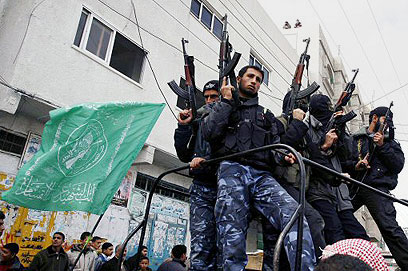
Palestinian forces suffering from emotional issues
Infighting, tensions between Palestinian and Muslim groups, leads security forces to seek counseling for tension, depression
Dr. al-Aqra cited the Palestinian website Dunia al-Waran, stating that these phenomena were seen primarily among wives and mothers of Palestinian security force members, but also among the troops themselves.
"One member of the Hamas security force came to me suffering from high tension, which was causing physical problems. He said he felt fear from the fact that he would burn in hell forever if he fired even one bullet at someone," the doctor said.
He told of another case, in which a member of the security forces arrived with similar symptoms. "He said he couldn't fire at another Muslim, and that he felt pain and bitterness," al-Aqra said.
"These are the feelings on both sides of the infighting, and emphasize that everyone, deep inside, rejects the civil war in his soul, rejects that which is unnatural," he explained.
Hamas members were troubled by an additional issue this week: an altercation with the Egyptian branch of the hitherto supportive Muslim Brotherhood.
The rift occurred after a senior leader in the organization, Abd al-Munam Abu al-Fatouh, announced that the Brotherhood supports the creation of a secular Palestinian state and a bi-national presence in Palestinian, as a solution to the Arab-Israeli conflict.
Hamas members were so incensed by al-Fatouh's announcement that the leader of the Muslim Brotherhood, Muhammad Mahdi Akef, had to release a special statement refuting it.
Akef said, in his statement, that the Muslim Brotherhood believes that "Palestine is Islamic and therefore, holy to Muslims and, thus, belongs only to Palestinians."
"No Palestinian has the right to refute this…The Zionists have no choice but to live under the rule of a Palestinian nation in which they will be free to worship their God and enjoy full rights of citizenship," Akef added.
"If the Zionists do not agree, our Palestinian brothers will have no choice but to resist and undertake all actions that are consistent with holy principles that were given to the Palestinians and that are in accordance with their national interests," he said.
Nonetheless, a source from the Muslim Brotherhood told the London-Based a-Sharq al-Awsat newspaper that Akef's statement was made primarily to reduce tension between the two groups.

Gunmen in Gaza. Civil war taking its toll (archive photo: Reuters)
After getting this crisis behind them, the Muslim Brotherhood addressed another issue this weekend. In an announcement published on Friday, the movement criticized the suicide attacks that took place in Morocco and Algeria recently and urged the attackers to aim "all of the resistance energy on the United States and Israel."
"Those youngsters that blew themselves up for no real reason showed a loss of vision, a lack of understanding and loss of the target...they should turn their resistance energy and all the means available to them against the (Islamic) nation's real enemy. The enemy that conquers, kills and violates rights. The enemy that is hiding in Jerusalem, Baghdad and Kabul," said Akef in his announcement.
Another problem brought up in a Palestinian television program is whether the Hebrew language should be included in the Palestinian educational system as another foreign language alongside English.
According to a report by Palestinian newspaper al-Quds, many oppose the idea. "Only one country speaks the Hebrew language, and it is not an important one," said former education minister Dr. Naim Abu al-Humus.
"There is no need to include the Hebrew language into the lesson plan since it would bring much material and work at the expense of other lesson plans," said math teacher Rina Hamoudeh.
Abu al-Humus also referred to the Education Ministry's current plan to introduce the English language into the system from as early as first grade, and to compose new text books.










